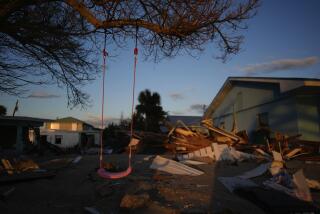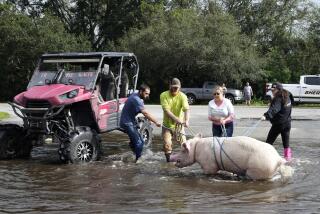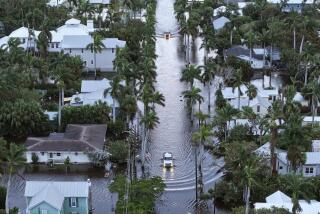Normally bustling Miami Beach turns into a ghost town after millions flee Hurricane Irma
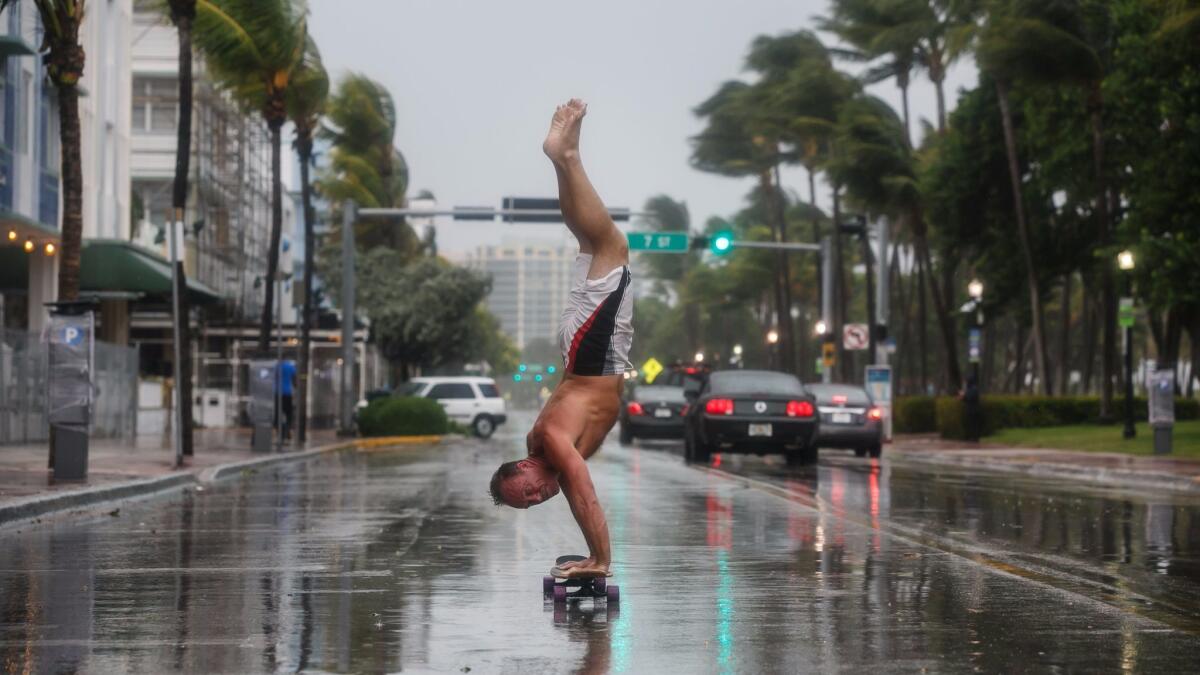
Reporting from Miami — The signature Art Deco hotels along Ocean Drive were all shuttered, a sullen sky yielded sheets of rain, and the elegant seaside palms swayed like elastic bands in the fierce wind.
Miami Beach, an iconic destination for generations of merry-makers, was a veritable ghost town Saturday in the aftermath of unprecedented evacuation orders in response to the threat from Hurricane Irma.
Although Irma appears likely to veer to the west and not hit Miami head-on, meteorologists say the area still faces potentially deadly, hurricane-force winds and storm surges of 3 to 6 feet.
On Saturday, as the storm’s effects began to be felt, relatively few ventured onto a wind-whipped and mostly deserted beach, normally filled with weekend revelers in search of sun.
The jaunty town known for its vivacity took on a forsaken character. Owners worried about the fate of their properties, many protected only with plywood strips and a few sandbags.
“I’ve never seen anything like it,” said Garrick Boyd, 26, who stood on Ocean Drive staring at the desolate tableau. “It’s like looking out in the country somewhere, not Miami Beach.”
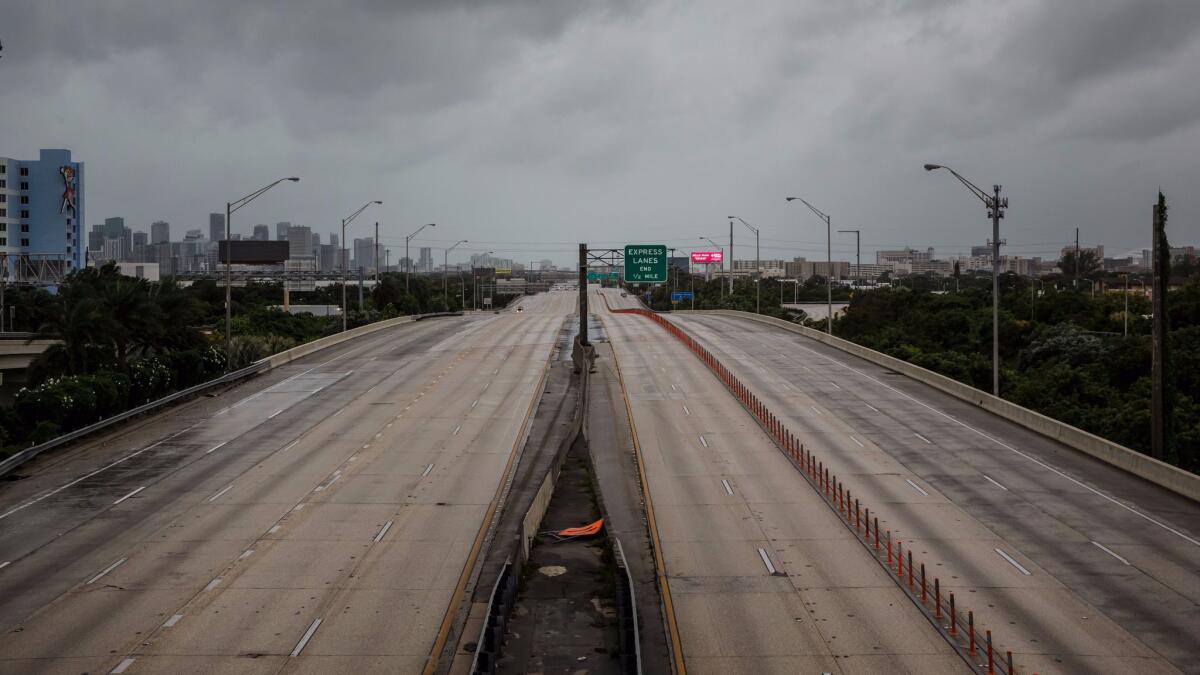
He was among the relatively few city residents who chose to disregard an evacuation order and wait out the storm.
“My apartment’s on the third floor, so that should be higher than any floods — at least I hope so,” said Boyd, a hotel worker. “And the windows are reinforced. So I think I’ll be OK. And now they say Miami is not getting a direct hit?”
Most of the city’s homeless population appeared to have been among those evacuated to shelters. But at least one homeless man was seen trying to sleep in the doorway of an upscale restaurant as the storm worsened.
In advance of Irma’s onslaught, officials in Miami-Dade County directed more than 650,000 people to leave their homes in Miami Beach and other vulnerable communities. Most decided to evacuate rather than face the wrath of Irma.
“I’ve been here 60 years. I’ve never heard of this kind of evacuation,” Miami-Dade Mayor Carlos Gimenez, a former Miami fire chief, told reporters last week.
Throughout the state, authorities ordered the evacuation of more than 6 million people, more than a quarter of Florida’s population.
The storm’s anticipated westward turn generated a hasty new series of evacuation orders in Tampa and elsewhere on the western side of the Florida peninsula.
But in Miami, despite the repeated warnings, a few people couldn’t resist venturing out in the deteriorating weather. In Miami Beach, a few skateboarders daring fate had pretty much clear sailing along an Ocean Drive largely devoid of traffic.
“We could use a little more wind to really get going,” said Adam Todd, 43, who was shirtless and doing hand-stands on his skateboard. “But it feels great.”
Another shirtless man — a 30-year-old Venezuelan native who goes by the name “Funky” Matas — rode his skateboard while wearing pink floaties on his biceps and an inflated children’s life preserver around his waist.
But the scene was generally gloomy as the rain and wind began to take their toll. Many wondered what would become of the town in Irma’s aftermath.
A plywood sheet covered the entrance to Mango’s, a popular Ocean Drive night spot. Spray-painted lettering advised patrons that the place would open again once Irma went on its way.
“We love Miami Beach,” read the sign. “Amen!”
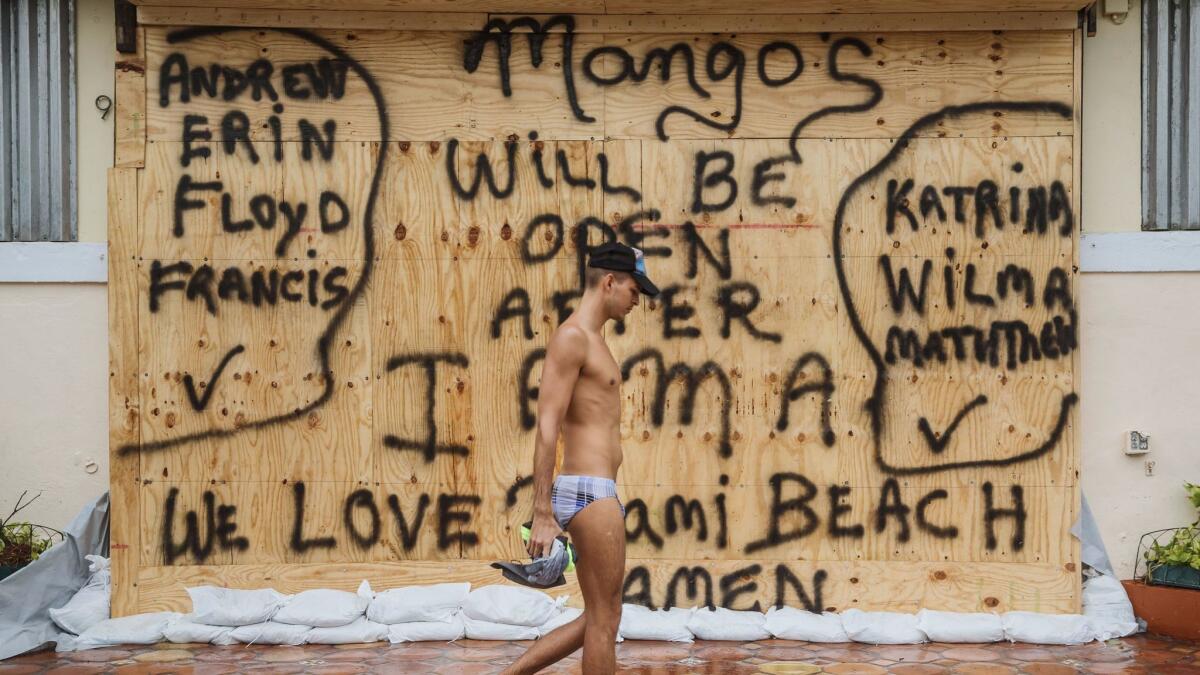
Luis Torrego was among those astounded at the sight of the many deserted sites.
“These places are normally so crowded you can’t get in,” said Torrego, 47. “It’s something hard to believe.”
Torrego told the story of a friend who had offered to book a hotel room for him in Tampa so that he could leave the Miami area for the storm. Now, his friend is looking to get out of Tampa as Irma veers that way.
“Looks like we got lucky this time in Miami,” Torrego said. “At least let’s hope so.”
At one hotel along Ocean Drive, Enrique Pupo Cabrera was resting on an exercise mat laid out atop an outdoor bar. Yellow police taping roped the grounds of the shuttered hotel, where Pupo works as a maintenance man and security chief.
“I’m here to take care of the place — we don’t want any trouble during the storm,” said Pupo, 63, a muscular man who said he was among the wave of Cuban immigrants who arrived during the so-called Mariel boatlift in 1980.
His eyes on Saturday were on the news from Cuba, where his wife, three children, nine grandchildren and other relatives were taking shelter in a home on a family farm. Irma has been battering the island before its expected northward lurch toward Florida.
But all was not all bleak on Miami Beach as Irma approached. There is also a longtime tradition of people coming to the beach in advance of hurricanes to view the power of nature.
“It feels awesome just to see this,” said Yvette Torroella, 39, as she and her family stood on the beach, watching the 6-foot breakers with frothy tops. “We’ve got everything ready at home for the hurricane. Food, whatever we need. So we wanted to come here and enjoy this sight.”
Others ventured into the water. Surfers caught waves. Paragliders took advantage of the winds. Some people waded in until the increasingly strong surf knocked them over. A topless woman hopped on a boogie board in the choppy sea.
In a steady rain, Pedro Granja, 47, was walking shirtless along Ocean Drive with a big smile on his face and a towel on his shoulder. He had just come from a refreshing dip in the roiling sea.
“It’s always a pleasure to be in the ocean,” said Granja. “But to go swimming in a hurricane? That is something special.”
Twitter: @mcdneville
ALSO
When Irma veered toward Naples, it was too late to evacuate
First hurricane-force winds hit Florida Keys as a weakened Hurricane Irma blows toward Florida mainland
Live Updates: Hurricane Irma expected to intensify on approach to Florida
More to Read
Sign up for Essential California
The most important California stories and recommendations in your inbox every morning.
You may occasionally receive promotional content from the Los Angeles Times.
